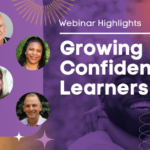Update 11/24/20: We’re happy to continue to include Overdeck Family Foundation in our portfolio of funders as they expand their support to LENA. Continue to read below on why their investment was and remains important to their strategy.
 We sat down with Carly Roberts, Program Officer, Early Impact at Overdeck Family Foundation, to learn more about why the foundation invested in LENA and what’s surprised them along the way. The foundation invested in LENA‘s parent program, LENA Start, and we’re grateful for their support that has enabled us to expand to reach 1,650 new families across the country this year.
We sat down with Carly Roberts, Program Officer, Early Impact at Overdeck Family Foundation, to learn more about why the foundation invested in LENA and what’s surprised them along the way. The foundation invested in LENA‘s parent program, LENA Start, and we’re grateful for their support that has enabled us to expand to reach 1,650 new families across the country this year.
Why is it important to invest in early childhood programs and education?
We know that the early years of a child’s life are critical and that supporting learning from birth to age five (and beyond) is key to setting children up for later success in school and in life. Children who enter school with readiness skills, including early language, have a much smoother path to success than those who start behind. We also know that parents and families are a key and often untapped resource in helping children develop to their full potential in those early months and years, and the parenting practices that LENA’s work emphasizes impact children’s development.
A primary focus of Overdeck Family Foundation’s grant to LENA is parent engagement. What is it about LENA’s work with parents that stands out to you?
We were drawn to LENA’s ability to take those practices that have been proven in scientific research and make them easy to enact at home amidst the day-to-day joys and challenges of parenting. The Overdeck Family Foundation is a data-driven institution, so LENA’s ability to make parent-child interactions visible and quantifiable resonated with us. We love that the numbers are coupled with social connection and empathy that data alone can’t offer. [quote]
What were you surprised to learn about LENA through the investment process?
Personally, I was surprised and excited to learn from LENA’s data that nearly everyone has room for growth. I thought I was the queen of interaction and talk with my infant son, so I was excited to try the LENA device myself. But when I looked at my data, I learned I could still do much more. As a new parent, it was encouraging to see concrete feedback. I was also surprised to learn how cost-effective the LENA Start program is. By coaching families in groups and leveraging settings where parents already gather, like schools, hospitals, libraries, and community-based organizations, LENA is able to reach more children and ensure they have strong starts.
What is unique to you about LENA’s data? What about its utility in early childhood?
LENA’s data quantifies parent-child interaction in a way that no other data source can match, making conversation visible and changeable. The timely nature of the data allows for more rapid action, compared to assessments that have longer timelines or interventions that can only be measured years later as children grow older.
By illuminating conversation through both programs and research, LENA is able to build a deeper understanding of language environments across populations. We can understand how any individual compares to others, or observe differences across subgroups, which can help the field better allocate resources.
What can early childhood-focused organizations like LENA do better to help funders understand their work and be a partner in philanthropy?
Effectively sharing the impact of your work is essential; it’s equally important to know how to articulate your work in ways that connect with your audience. While data are the most compelling to some, others look for powerful storytelling. The best partners weave data and storytelling together to help funders understand why the work matters and how it’s making a difference.
Every nonprofit is sitting on a great result or achievement that they aren’t spotlighting enough. What success should LENA be highlighting the most in the future?
LENA’s research connecting early language intervention and outcomes with later school achievement is incredibly powerful. For instance, not only do 0- to 3-year-old children in LENA Start gain language skills nearly twice as fast as their peers, but they are more likely to arrive at school ready to thrive. Early data from a study in Huntsville, Alabama indicates that LENA Start is linked to a large (d=0.7) effect on pre-K readiness, years after the intervention itself. The behaviors promoted by the program also have ripple effects on children’s learning — a 10-year-longitudinal study (Pediatrics, 2018) correlates the conversational turns a child experiences at ages 1-3 with their language skills and IQ at ages 9-13.
Impressive results like these could be further leveraged to encourage additional public funding to support young children before they even enter the classroom. They could also be shared with parents to build demand for the program and encourage local organizations to adopt it.



